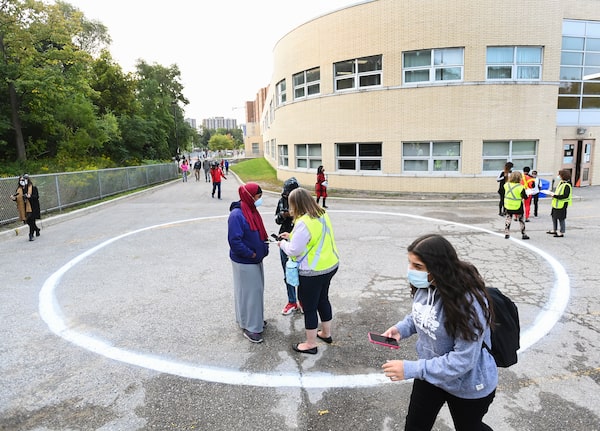
Students and teachers at Portage Trail Community School, which is part of the Toronto District School Board (TDSB) in Toronto on Sept. 15, 2020. The TDSB is set to vote on a motion that would include caste as a protected category. Caste prejudice has followed some South Asians as they immigrated to countries such as Canada.Nathan Denette/The Canadian Press
The Toronto District School Board is set to vote on a motion that would include caste as a protected category, alongside race, gender, sexuality and other identities. If passed, the motion would be the first of its kind in Canadian schools.
Toronto District School Board trustee Yalini Rajakulasingam brought the motion before a committee on Feb. 8. On Wednesday, the board will hold a final vote. Ms. Rajakulasingham, who is the trustee for Scarborough North, said parents who identified as members of oppressed castes told her about bullying, harassment and slurs their children faced.
Update: TDSB votes to recognize that caste oppression exists in Toronto schools
The caste system is a form of social stratification that has existed in the Indian subcontinent for several thousand years. Historically, dominant caste groups have enjoyed greater rights and privileges vis-à-vis oppressed castes, who have been subjected to social ostracization, violence and exclusion from certain professions. Caste prejudice has followed some South Asians as they immigrated to countries such as Canada.
“We realized that even at [the TDSB’s] human rights office, there was no way to file a complaint under caste,” Ms. Rajakulasingham said. “It was being filed as either race or religion. And we know that caste is its own specific power structure. It doesn’t function like race. It is its own category.”
Ms. Rajakulasingam, whose parents moved to Canada from Sri Lanka as refugees in 1986, identifies as a member of an oppressed caste. The stories she heard from parents in her ward resonated with her own life experiences growing up in Scarborough.
On the lowest rung of the caste ladder in South Asia are the Dalits, who were previously pejoratively referred to as “untouchables.” When India gained independence from British rule in 1947, its new constitution, which was written by Dalit civil-rights activist Dr. Bhimrao Ramji Ambedkar, explicitly banned caste discrimination and established affirmative action for oppressed castes.
However, Dalit-rights advocates in India and abroad argue that prejudice against oppressed castes has continued into modern day South Asian societies around the world. India’s growing Hindu nationalist movement has targeted Dalits, along with Muslims, Sikhs and Christians.
Vijay Puli, executive director of the Canada-based South Asian Dalit Adivasi Network (SADAN), said those attitudes have followed Dalit immigrants even though they have left India behind. “There is a lot of caste discrimination in Canada. Not just in schools, but in workplaces too. Casteist slurs are regularly used in schools. It happens through cultural practices, social settings and in rituals and traditions,” he said.
The TDSB’s proposal has drawn some opposition. A group called the Canadian Organization for Hindu Heritage Education (COHHE) has started a petition calling for a stop to the motion. The group says that adding caste to the list of protected identities is Hinduphobic. (The caste system has roots in Hinduism but exists in other communities.)
“There is little evidence or reports of ‘caste oppression’ in Toronto and for that matter Canada,” states the petition, which has more than 5,000 signatures. “Hence the declaration that ‘there is rise in documented anti-caste discrimination in the diaspora, including in Toronto’ makes the motion misleading, prejudiced and lacking in integrity.”
Ms. Rajakulasingam, who is Hindu, said she was confused by the allegation that the motion was targeting the Hindu faith. She said the motion did not single out any faith, but that it affected South Asian, African and Caribbean diasporas.
Jaskaran Sandhu, a Brampton resident and board member of the World Sikh Organization, said that caste dynamics exist in all South Asian communities. Guru Nanak Dev, the founder of Sikhism, singled out caste as a mode of oppression.
“As Sikhs, we are vehemently opposed to the caste system. We understand the importance of fighting caste oppression, wherever it exists,” Mr. Sandhu said.
Chinnaiah Jangam, associate professor at Carleton University and co-founder of SADAN, has faced death threats and online attacks because of his work on caste oppression and Hindu nationalism. In April of last year, SADAN held a consultation with TDSB board members and shared personal experiences of Dalit students in Toronto, Dr. Jangam said.
“An oppressed-caste girl in the 11th grade was told by her classmate that if she were a prostitute, she would not even get a penny because she had dark skin,” he said, outlining one such incident. “How can you say there is no caste-oppression in Canada?” he added.
In January, 2022, California State University made caste a protected category. In December, Brown University became the first Ivy League university to do so. The TDSB’s vote comes close on the heels of a historic decision by the Seattle City Council, which became the first jurisdiction in the United States to explicitly ban caste discrimination late last month.
Thenmozhi Soundararajan, executive director of the U.S.-based civil-rights group Equality Labs, said, “This motion aligns TDSB with this movement for equity that has started in educational institutions and is taking the world by storm.”
Ms. Rajakulasingam said the best way to end a cycle of discrimination is to sensitize children.
“When we recognize oppression, and we begin to speak about it, students can heal and feel empowered by their identities. Like how we feel accepted by racial identity, we want students to feel accepted by whatever their caste location is,” she said.